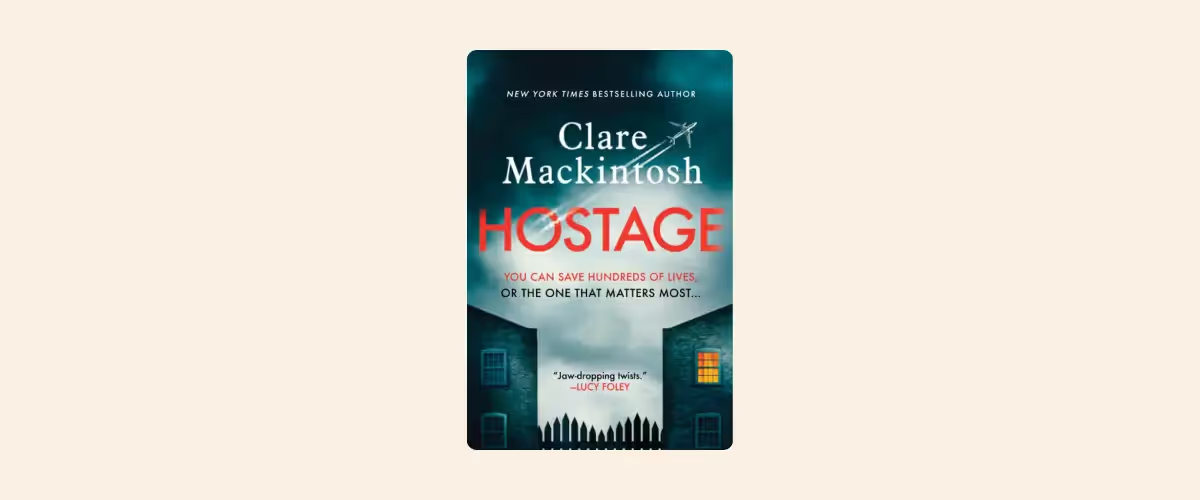There are lots of things you can expect from the writing life: excitement, fun, creative freedom, deep rewards, lifelong friends... But choosing to be a writer comes with other responsibilities too, and one thing you can count on is the fact that you will, sometime, somehow, encounter setbacks.
Even the most successful authors, those who’ve won awards and sold millions of copies, grapple with failure regularly—just ask our writing coach, Clare Mackintosh. With more than two million copies of her books sold worldwide, Clare is the award-winning author of Sunday Times No. 1 bestsellers I Let You Go, I See You, and Let Me Lie, as well as bestsellers After the End, Hostage, the DC Ffion Morgan series (comprising The Last Party, A Game of Lies, and Other People’s Houses), and a memoir on grief: I Promise It Won’t Always Hurt Like This. Her books have been published in more than 40 countries.
Clare’s debut, I Let You Go, was also a New York Times bestseller and won the Theakston Old Peculier Crime Novel of the Year in 2016—plus, its French translation (Te Laisser Partir) won Best International Novel at the Cognac Festival Prix du Polar Awards. But the path to success for Clare, and for I Let You Go, did not run smooth.
Like most writers, Clare has had multiple setbacks of varying degrees as an author, and she knows what it feels like to fail (or at least to receive feedback that makes you feel that way). In this article, Clare generously shares her experiences and insights on navigating the choppy waters of the writing life so that you can know you’re not alone. There is always hope.
.avif)
Every writer faces rejection (even those with agents)
So much is made of the struggle to get a debut novel published; of the agency rejections with which we could paper our walls, and the feedback emails from editors that say this isn’t for me. And it is a struggle. We fail and we fail, and then we fail again, and then—hopefully—we succeed.
Success as a writer doesn’t always come from signing a deal with an agent, or seeing your first book released. It’s a tale as old as time in publishing that, unfortunately, these things don’t always guarantee a long and happy life as a full-time writer.
What, then, is a writer to do when they hit setbacks? When they’re receiving feedback that once more has them doubting their writing? Let me share my experiences with you: because as writers, we all matter, and we all need to be able to make sense of our writing setbacks when they happen.
{{blog-banner-13="/blog-banners"}}
I didn’t struggle to find a literary agent. An introduction was made, and she liked my book, and that was that. I’d made it, I thought. The end goal! The aim of so many unpublished writers!
But just as writing The End on the final page of your first draft is simply a signifier of harder work to come, so getting an agent is just the beginning.
I Let You Go was rejected by multiple editors. The magic wasn’t there for me, said one. I don’t think either the writing or the hook is strong enough to make it stand out, said another by way of feedback. It was, thought one editor, a slightly awkward mesh of police procedure and female suspense.
However, as we all know, it only takes one yes, and that yes resulted in a million sales, two awards, and translation rights in more than 40 territories.
.avif)
Setbacks are a natural part of the writing process
When I look back at the years since I Let You Go sold, I see more failures than successes. That’s not to say that I don’t celebrate the great times—I continue to enjoy an incredible career—but I promise you, those times look very different from my side of the desk.
I wrote my ‘difficult second book’ and found it not just difficult, but impossible. It wasn’t as good as I Let You Go, and the options were brutal: publish a poor imitation of my debut, or hit delete and start over with a new project, however wrong that might feel.
I chose the latter. Thus, my second published book became I See You, and—as is so often the way when we reject the first idea we think of in favor of something harder to grasp—it was infinitely stronger.
.avif)
Keep looking for the right fit
I was halfway through my third novel when I recognized the signs: the prickling across my neck, like someone was standing behind me, peering over my shoulder.
The premise wasn’t good enough.
Writing can be polished in self-edits, our characters can be fleshed out, and the plotting of our novel tightened... But the premise? The premise is everything, and mine was weak.
I gave myself my own rejection and jettisoned six months’ work without wasting another moment.
The pattern repeated itself between After the End and Hostage, with me writing an entire first draft of a manuscript no one will ever read. On that occasion, the premise was strong—brilliant, even—but the execution didn’t work, and I couldn’t fathom how to lift it. Some time after I’d set it to one side, current affairs made the story so politically sensitive that I realized I’d never be able to return to it.
.avif)
I’ve lost count of the stories I’ve thrown away along the journey so far. The novels I’ve planned in intricate detail, then never written; the dozens of drafts that languish on my computer.
After almost ten years of writing full-time, I have come to understand that failing is part of my process. That I will write ten words for every one that makes it into print, and that rejection—from myself, my agent, or my editor—is simply part of the propulsion I need in order to grasp the idea that will work.
Don’t get me wrong, it doesn’t hurt any less—I still sob with frustration over months of wasted work and yet another round of revises—but it is what it is. Each failure takes me closer to the next goal in my writing life.

After almost ten years of writing full-time, I have come to understand that failing is part of my process. That I will write ten words for every one that makes it into print, and that rejection—from myself, my agent, or my editor—is simply part of the propulsion I need in order to grasp the idea that will work.
—Clare Mackintosh
Clare’s top tips on coping with setbacks
You’ve had them. I’ve had them. We’ve all had them. And let’s be honest about the writing business: there will be more. If you’re struggling with disappointment or setbacks right now, I have some advice for you:
1. Reframe failure as practice
Think of a difficult training run for the marathon you’ve yet to complete. A dozen practice bakes for the perfect cake. The many sketches on craft paper of an award-winning painting. The endless rehearsals before curtain-up. Remember: no project arrives in pristine condition.
2. Consider other people’s failures
There is something deeply comforting about hearing successful people talk about their setbacks. One of the the best writing podcasts on this subject is Write-Off with Francesca Steele.
3. Don’t fight a failure
If I’d published that second book of mine, it would have been poorly reviewed by readers. Sales would have dipped. Would I have got a second publishing deal? A third? Listen to your instincts and that feeling in your gut—and to trusted people around you—and know when to abandon a project.
4. Never give up
This might sound like it contradicts the previous point, but it doesn’t. Try again—but try differently. Try better. You can do it.
Each failure takes me closer to the next goal in my writing life.
—Clare Mackintosh
Wherever you are on your writer’s journey, we can offer the complete pathway from coming up with an idea through to ‘The End.’ Our novel writing programs include personal mentorship from published authors, live classes, and step-by-step self-paced lessons to inspire you daily, and we’ll help you complete your book with our unique one-hour-a-day method. Learn from bestselling authors and publishing editors to live—and love—the writer’s life. Sign up and start today. The Novelry is the famous fiction writing school that is open to all!
.avif)

.avif)
.avif)


.avif)


.avif)